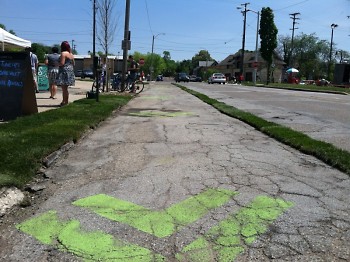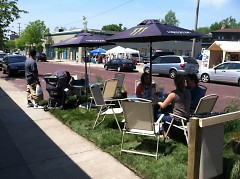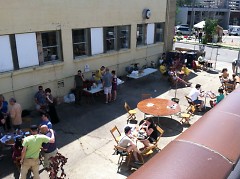State Street came to life last weekend as a group of urban advocates transformed the area into a destination filled with useful public spaces, events and local shops. Otherwise known as re:STATE, the Grand Rapids Better Block organization implemented various types of tactical urban planning techniques that brought vibrancy to the business district.
Josh Leffingwell, one of the organizers, says the goal of re:STATE was to recreate "a street in need of an intervention while fostering community engagement by showing neighbors that they have the ability to make a change."
It was a successful display meant to inspire the city, the neighborhood and the citizens of Grand Rapids by showing them how to bring a street to life, and why a vibrant street is a crucial asset to community and neighborhood life.
“Re:STATE saw more people on the street, which in turn drew more people onto the street,” says Leffingwell. This flow of people participating in street life transformed the area into a destination as volunteers, neighbors, supporters and strangers alike flocked into the area eager to participate in events and socialize within various created public spaces.
The Greater Grand Rapids Bicycle Coalition was an active participant in the event as they provided valet bicycle parking, promoted the importance of alternative transit and educated participants about the benefits of cycling for individual and community life.
A protected bike lane was also created along the east side of the street.
Thomas Tilma of Greater Grand Rapids Bicycle Coalition explained that a protected bicycle lane helps “show the steps that can be made along State Street to create a complete street that serves not just the needs of motorists, but also the needs of cyclists, pedestrians and transit riders."
The Alleyway Café took over a vacant space between two buildings and altered it into a lively beer garden. Patio seating was set up and filled with people socializing. Music was provided by local band The Big Yes Everything.
Brewery Vivant provided beer, and re:STATE helped the neighborhood re-imagine the area by turning an otherwise useless space into a place that facilitates community gathering.
On-street parking spaces were revamped into public space with a city planning tecnique referred to as parklets. Parklets extend city sidewalks and provide seating for both businesses and the general public.
The Rapid utilized a parked bus to educate and encourage the importance of transit by offering vehicle tours to people who were unfamiliar or intimidated with the process by explaining how to pay for a ride, use the bicycle rack and how to stop the bus.
Food trucks and tables filled one parking lot and gave the pedestrians of State Street various options for dining. Tents and pop-up retail shops called bouquiniste boxes were set up along the edge of these parking lots in order to show the benefits of having a variety of retail space along a street.
Landscaped elements were displayed along the street’s sidewalks. The West Michigan Environmental Action Council participated in the event by using the planters to actively inform pedestrians about the importance of street landscaping for stormwater management.
Re:STATE helped the neighborhood re:vision Foster Park as it became a useful place throughout the weekend filled with children and adults alike playing, eating or just lying in the shade.
Re:STATE had several events throughout the weekend. On-site bicycle tune-ups were provided by two community bicycle groups: Spokefolks on Saturday and Boston Square Community Bikes on Sunday.
The old Public Museum was turned into a "Brew and View," showing three different movies on Saturday. The Calkins Law Office displayed two exhibits. One exhibit was based on the history of the building, and another on the future vision of State Street that was put together by architecture and planning students from Calvin College.
There were several local businesses set up both along the road and inside a vacant storefront. By using one storefront to house multiple shops, re:STATE demonstrated how to share a single retail space to jump-start economic prosperity for local and startup businesses.
Re:STATE shows that a diversity of business types can serve the needs of the neighborhood.
Participant Rusty Zylstra, owner of Mercy Leather, says re:STATE gave him "the opportunity to talk with people and promote the business,” and feels that State Street “has the potential to look something similar to Eastown."
The Rapidian, a program of the 501(c)3 nonprofit Community Media Center, relies on the community’s support to help cover the cost of training reporters and publishing content.
We need your help.
If each of our readers and content creators who values this community platform help support its creation and maintenance, The Rapidian can continue to educate and facilitate a conversation around issues for years to come.
Please support The Rapidian and make a contribution today.



